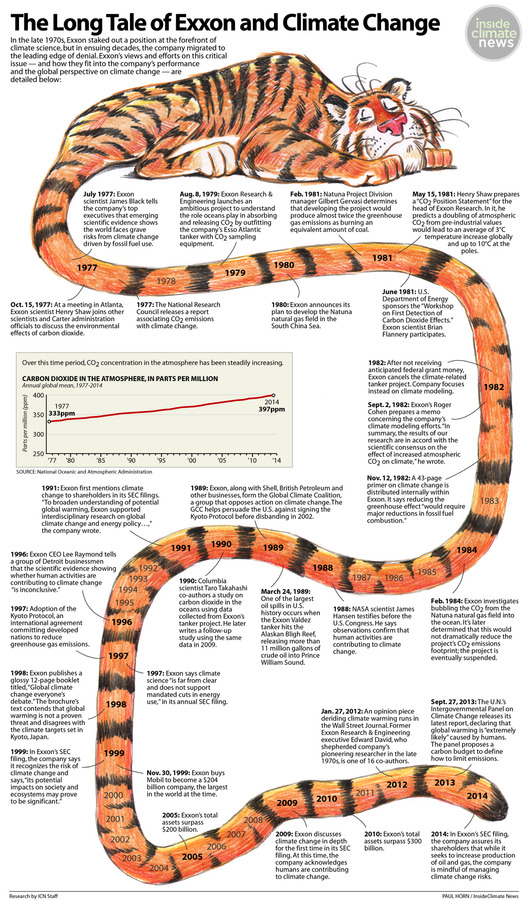Fossil Fuel Disinformation Case Study: Exxon
When browsing Instagram for your general energy providors, as one does, you see this, and you're impressed! Exxon must be really committed to helping protect the planet from climate change to include it in their account bio, especially when so much of climate change is caused by their exact industry. So then you wonder...have they always been so self-aware?
Unfortunately, the answer is a pretty resounding yes; they just haven't always been the good guys in that story.
In 2015, the non-profit, non-partisan news organization InsideClimate News spent eight months investigating Exxon's “engagement with the emerging science of climate change.” They used interviews with former Exxon employees, scientists, and federal officials, hundreds of pages of internal Exxon documents, as well as thousands of documents from archives including those held at the University of Texas-Austin, the Massachusetts Institute of Technology and the American Association for the Advancement of Science to get a complete picture of what Exxon knew and when, and how that translated to what the company reported to the rest of the world.
The full reports can be found here, but essentially it was as follows:
Highlights:
- July 1977: Exxon scientist James Black alerts top executives that research is showing fossil fuel use is driving climate change, which has intense risks associated with it.
- 1982: Exxon focuses its climate research on climate modeling. The research produced appeared on-par with the understanding other climate scientists had of the climate system at that point, and demonstrated that fossil fuel combustion would need to be greatly reduced to reduce the greenhouse effect
- 1989: Exxon, alongside Shell, British Petroleum (BP) and other businesses form the Global Climate Coalition (shown on the Timeline page), which helps convince the US not to sign the Kyoto Protocol later on.
- 1991: Exxon first mentions climate change to its shareholders in SEC filings
- 1997: Exxon states climate science "is far from clear and does not support mandated cuts in enegy use" in its SEC filing
- 1998: Exxon publishes "Global climate change, everyone's debate" booklet, stating that climate change is not a proven threat
- 1999: Exxon says it ackowledges the risk of climate change and "its potential impacts on society and ecosystems may prove to be significant"
- 2009 (10 years later!): ExxonMobil finally discusses climate change at length in its SEC filing
- 2012: WSJ piece "No Need to Panic on Global Warming" (shown on the Timeline page) is co-authored by Exxon's former R&E executive Edward David
- 2014: ExxonMobil assures shareholders it is mindful managing climate change risks while still seeking to increase oil and gas production in SEC filing
Since then, many more news organizations have uncovered even more disturbing documents connecting Exxon (and eventually ExxonMobil) to a number of misinformation campaigns that directly contradicted everything their own research programs had uncovered decades prior. Today there are even a number of #ExxonKnew campaigns with the sole goal of seeing ExxonMobil pay for the damage they have had by intentionally misleading the public away from climate change solutions. Today, ExxonMobil does actually contribute to new and innovative technologies designed to help reduce CO2 emissions and mitigate climate change, but their business model still requires them to drive oil and gas production as much as possible, and we cannot get the lost 30 years of progress and increased warming back.


